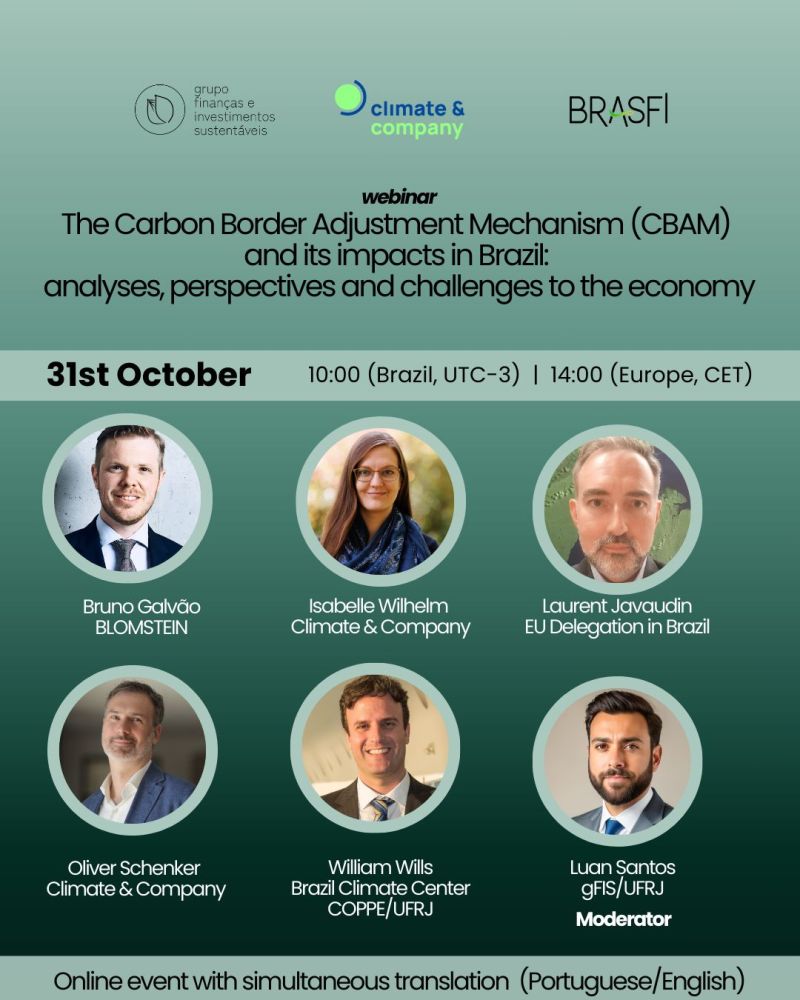
Webinar Recap: The Carbon Border Adjustment Mechanism (CBAM) and its impacts on Brazil: Analysis, perspectives and challenges for the economy
October 31, 2023
How does the EU’s Carbon Border Adjustment Mechanism (CBAM) impact Brazil? This was the leading question of this webinar that Climate & Company hosted in collaboration with the Sustainable Finance and Investments research group (gFIS: grupo Finanças e Investimentos Sustentáveis) and the Brazilian Alliance for Sustainable Finance and Investments (BRASFI). Here, you can find a summary of the event.
In this insightful webinar, experts from both Brazil and the EU came together to discuss the implications and opportunities surrounding CBAM in the Brazilian context. The panel explored the following guiding questions:
- What are the real impacts of CBAM on the Brazilian and European economy?
- What are the main challenges facing Brazilian sectors exporting to the EU?
- Are there opportunities associated with implementing this new mechanism?
- Are the affected sectors and businesses already aware that CBAM started a transitional phase on 1st October of this year?
The webinar was held on 31st October 2023 and also aimed to foster dialogue between stakeholders in the EU and Brazil. The following speakers shared their views:
- Ana Carolina Vidal – Associate at the German law firm BLOMSTEIN
- Laurent Javaudin – Counsellor for climate, environment, and energy at the EU delegation to Brazil
- Oliver Schenker – Senior Advisor at Climate & Company
- William Wills – Project director at the Brazil Climate Center
The panel was moderated by Luan Santos, professor at the Faculty of Business Administration and Accounting Sciences (FACC) and the Production Engineering Programme (PEP/COPPE) at the Federal University of Rio de Janeiro (UFRJ) and the coordinator of gFIS.
These are our 4 key takeaways from the webinar “The Carbon Border Adjustment Mechanism (CBAM) and its impacts on Brazil: Analysis, perspectives and challenges for the economy”:
- CBAM must be seen in conjunction with the EU’s Emissions Trading System (ETS): It complements the ETS to prevent carbon leakage (when carbon-intensive production simply moves outside of Europe rather than actually becoming “greener”), which would otherwise jeopardise emission reduction goals.
- Brazil holds great potential in the green energy sector, making it well-positioned for favourable outcomes under CBAM regulations.
- The revenue of the EU generated through CBAM could be reinvested to support carbon mitigation measures by affected trading partners.
- Effective implementation of CBAM in Brazil requires a collective effort that involves not only regulatory compliance but also a focus on reducing domestic emissions.
The webinar was recorded and is available on the BRASFI YouTube channel. You can also find it embedded below. We encourage you to watch it!
If you have any questions or suggestions regarding the topic, feel free to reach out to us! We would love to get in touch.

